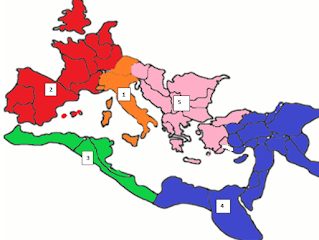Herodotus records the following prophecy in his account of the story of Telesilla's defense of Argos:
θήλεια τὸν ἄρσενα νικήσασα
ἐξελάσῃ καὶ κῦδος ἐν Ἀργείοισιν ἄρηται,
πολλὰς Ἀργείων ἀμφιδρυφέας τότε θήσει.
ὧς ποτέ τις ἐρέει καὶ ἐπεσσομένων ἀνθρώπων
δεινὸς ὄφις τριέλικτος ἀπώλετο δουρὶ δαμασθείς.
Verum, quando marem praevertet foemina victrix,
inter et Argivos referet praelustris honorem;
tunc Argivarum reddet plerasque gementes,
ut venturorum aiat quis quandoque virorum:
telo saevus obiit nuoso corpore servens.
--Herodotus Histories 6.77; Translated into Latin by Johannes Schweighaeuser (1814)
When a woman conquers a man,
And drives him off,
She will raise up glory among the Argives,
She will bring tears upon the cheeks of many Argive women.
One day, someone in the future will say
“The triple-coiled dragon, now tamed by the spear, is dead.”
|
HERODOTUS |
MAP: |
|
Name:
Herodotus Date: 484 – 425 BCE Works:
Histories |
REGION 5 |
|
BIO: |
Timeline: |
|
Herodotus was an Anatolian-born Greek author
who lived during the 5th century BCE. He was born into nobility,
and used his privilege to travel the Mediterranean extensively. His magnum
opus, Histories, details wars between the Greeks and the Persian Empire,
as well as important cultural information for these and Egyptian culture. He
is often called the “Father of Greek History,” since his work is the earliest
attempt within Greek literature to collect research and primary accounts of
historical events. |
GOLDEN AGE GREEK |


No comments:
Post a Comment
Note: Only a member of this blog may post a comment.